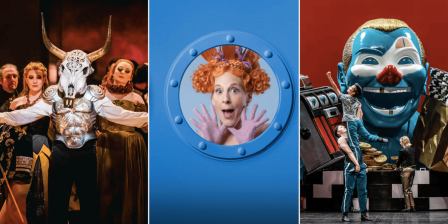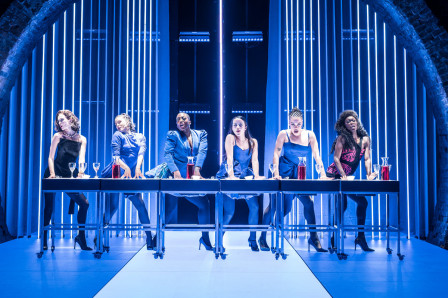Review: OKLAHOMA! at Wyndhams Theatre
On a brightly lit, pine wood stage which extends to the facia panels on the walls and boxes around the Wyndham’s auditorium, (effectively rendering them like cheap Western coffin lids) the banjo, guitar and string-strumming band members remain in full sight of the audience from the get go in this production of spectacular extremes. It’s certainly Oklahoma! as you’ve never seen it before, or indeed heard it…or once loved it.
 Greg Hicks (Andrew Carnes), Philip Olagoke (Cord Elam) and Georgina Onuorah (Ado Annie) in Oklahoma! Photo by Marc Brenner.
Greg Hicks (Andrew Carnes), Philip Olagoke (Cord Elam) and Georgina Onuorah (Ado Annie) in Oklahoma! Photo by Marc Brenner.
Traditionalists will wince at every liberty taken by director Daniel Fish and musical supervisor Daniel Kruger’s inconsistent updating of Rodgers’ and Hammerstein’s 1943 tale of love and jealousy on the western plains. Cowpokes, prim and flirtatious gals, snake-oil salesmen, wise elderly matrons and gruff ol’timers rub shoulders (and each other up the wrong way) as they saunter and croon, belt and snort their way through the musical numbers once so beautifully brought to life by Shirley Jones, Gloria Grahame and Gordon McRae in the groundbreaking 1955 MGM movie version beloved by generations.
So what were the creators of this challenging Frankenstein’s monster hoping to achieve? The obvious answer, seems to be a disjointed, harsh and even glib modernised interpretation of the original, reliant upon TV talent show vocal delivery, neck roll humour and neurological disorders in order to deliver a feast fit for the Z Generation and its miserable preoccupation with stress, wannabe disappointment, unfairness and blame. In places, it’s an excruciating rats nest of unpleasantness periodically given a heroin jolt of humour and naive innocence to lift the audience’s spirits, as proceedings plod along at an underwhelming pace.
Even the several periods of total blackout where microphones and then occasional hand held cameras are used to continue relaying the scenes - thus imbued with a kind of sensory jeopardy - feel amateurishly contrived (imagine a New York drama school acting class circa 1980 and you’ll get the picture). The show may have garnered Tony Awards attention stateside, (where the brilliant wheelchair-bound Ali Stroker brought a burst of extraordinary energy, charm and zing to the production), but here, even allowing for some intriguingly Ben Mink-style musical arrangements, scenes rarely rise above a dirge, which feels an almost impossibly disappointing result given the quality of the source material.
There’s much talent in evidence, but once the first glimmers of encouraging optimism — inherent in the opening 20minutes of Curly and Laurey’s mutually restrained interplay — have elapsed, they are replaced by a cloud of self-conscious, self-
The question is whether nowadays it is permissible to decry such efforts to reimagine and modernise old favourites. Or perhaps there have been one too many recent examples of the Emperor’s New Clothes and it is time to start calling-out those where the original creators would almost certainly have been horrified at the treatment of their material. There is certainly enough happening on the Wyndhams stage currently to fuel a most lively debate amongst theatregoers of all ages and appetites for reinvention. This reviewer may have been unimpressed and underwhelmed, but if you are sufficiently intrigued, why not go along and make up your own mind.
Latest News

 Miss Saigon to return to the West End in 2027
2 February 2026 at 10:42
Miss Saigon to return to the West End in 2027
2 February 2026 at 10:42

 Everybody's Talking About Jamie 10th Anniversary Tour announced
2 February 2026 at 10:13
Everybody's Talking About Jamie 10th Anniversary Tour announced
2 February 2026 at 10:13

 Opera Shows to See in London in 2026
2 February 2026 at 09:35
Opera Shows to See in London in 2026
2 February 2026 at 09:35

 Review: AMERICAN PSYCHO at Almeida
1 February 2026 at 23:59
Review: AMERICAN PSYCHO at Almeida
1 February 2026 at 23:59